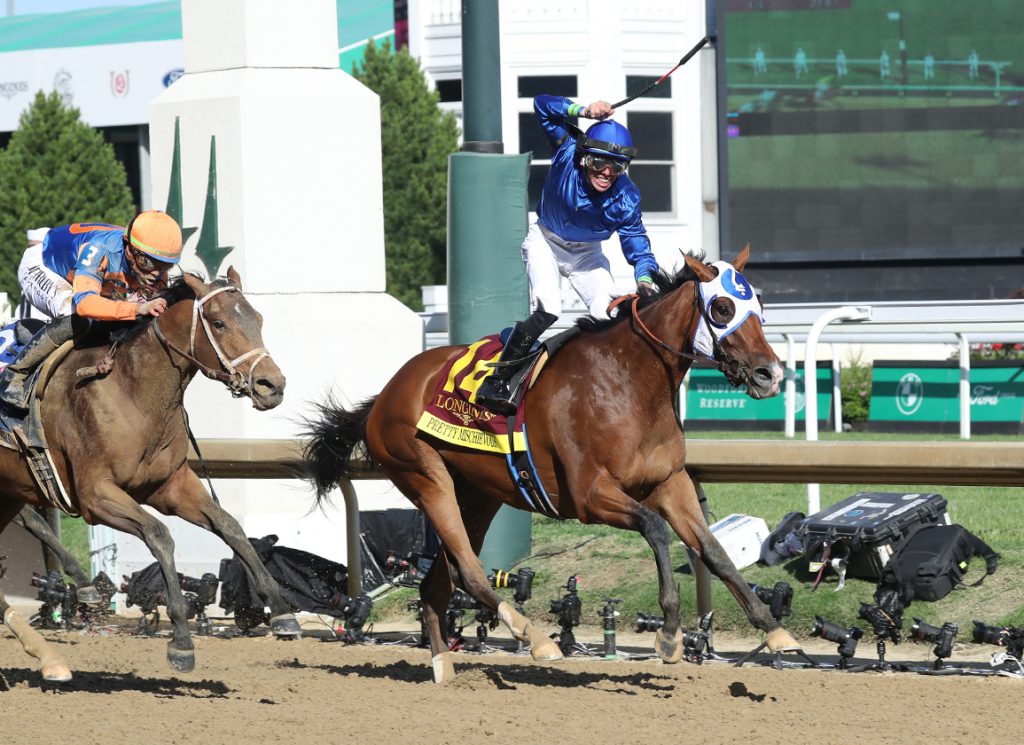The 150th GI Kentucky Derby scheduled for Saturday, May 4 will be the richest in history as the purse for America's greatest race has been elevated to a guaranteed $5 million, Churchill Downs Inc. (CDI) said in a release Wednesday.
The $2 million increase to the race highlights a record-setting, 50-race stakes schedule cumulatively worth $25.6 million for Churchill Downs' 2024 Spring Meet, which will be run over 43 dates from April 27-June 30/
The Derby purse structure was the subject of a Chris McGrath TDN interview with John Sikura, where he questioned the $3 million purse. The cause was later taken up by Mike Repole.
Prize money for the stakes schedule increased 25% or $5.1 million from last year's $20.5 million lineup which is due to historical horse racing. Prior to the debut of historical horse racing at CDI's Derby City Gaming in September 2018, that year's Spring Meet featured 32 stakes races worth $8.8 million. There are now 18 additional Spring Meet stakes, and prize money for horsemen in those events has grown 190% or by $16.8 million.
“These record purse increases are a symbol of the health of horse racing in Kentucky,” said Bill Carstanjen, CEO of Churchill Downs Incorporated. “Churchill Downs Incorporated's over $1 billion investment into live and historical horse racing in Kentucky over the last five years has meaningfully strengthened the entire Kentucky Derby Week and year-round racing program. It's important to acknowledge the state legislature for its commitment to working closely with private enterprise in a truly collaborative partnership to support the continued growth of Kentucky's signature industry.”
Thirty-eight of the 2024 Spring Meet stakes races received significant purse hikes, including $250,000 boosts to each of the following: the $1.5 million GI Kentucky Oaks; $1 million GI La Troienne S.; $1 million GI Churchill Downs S.; $1 million GI Derby City Distaff; and $750,000 GII Churchill Distaff Turf Mile. Each of the track's seven Grade I events, including the Old Forester Bourbon Turf Classic S. and Stephen Foster S., feature a minimum $1 million purse.
With a record $5 million in prize money now guaranteed for the Kentucky Derby, the winner will receive the event's highly sought-after gold trophy, a $3.1 million payday and possibly millions more as a stallion after retirement from racing. Also, $1 million will be awarded to the runner-up, $500,000 to third, $250,000 to fourth and $150,000 to fifth.
Previously, the Kentucky Derby purse had been worth $3 million since 2019, and was $2 million from 2005-18 and $1 million from 1996-2004.
“It is truly gratifying to view the steady growth of the Churchill Downs racing product and the entire Kentucky horse racing and breeding industry, which bettors around the world have embraced,” said Churchill Downs Racetrack President Mike Anderson. “Through the purses generated by the racing association and the Kentucky Thoroughbred Development Fund, Kentucky horsemen and horsewomen are reaping the benefits of Churchill Downs Incorporated's historic investment as we celebrate this year's milestone 150th Kentucky Derby.”
At $1.5 million, the 1 1/8-mile Kentucky Oaks–the Derby's sister race staged one day prior on Friday, May 3–remains the nation's most lucrative race for 3-year-old fillies. It had been worth $1.25 million since 2019, and was $1 million from 2011-18 and $500,000 from 1996-2010.
All told, there will be a record 22 stakes races cumulatively worth $17.5 million staged over Kentucky Derby Week (April 27-May 7), including nine stakes totaling $10.8 million on Derby Day and seven totaling $5.3 million on Oaks Day.
Four races on Kentucky Derby Week will offer horses an entry and travel incentive to run in some of Europe's most prestigious races. The winner of the Old Forester Turf Classic will receive a berth to either the one-mile G1 Queen Anne S. or the 1 1/4-mile G1 Prince of Wales's S. at Royal Ascot in mid-June. Earlier on the Kentucky Derby Day program, the winner of the GII Twin Spires Turf Sprint will receive an entry to the G1 King's Charles III S. (formerly known as the King's Stand), also staged at Royal Ascot.
Three-year-old turf specialists in the GII American Turf and GII Edgewood S. can receive their entry to either the G1 Betfred Derby or G1 Betfred Oaks at Epsom Downs. The winner of the American Turf on Kentucky Derby Day will receive an entry and travel stipend to compete in the Betfred Derby while the winner of the Edgewood on Kentucky Oaks Day will receive the same benefits for the Betfred Oaks.
The first condition book of scheduled races is being finalized by Vice President of Racing Ben Huffman and is expected to be published in late January. More than $57 million in total prize money is expected to be offered during this year's Spring Meet (pending Kentucky Thoroughbred Development Fund final approval). Purses for maiden races will be $120,000 while allowance races will range from $127,000 to $141,000.
Spring Meet stall applications are due Friday, Mar. 1. Following its annual closure for wintertime renovations, the Churchill Downs stable area will reopen Tuesday, Mar. 19. The first day of training on the main dirt track will be Friday, Mar. 22.
For the second consecutive year, Churchill Downs Incorporated's nearby Trackside Louisville, which accommodates more than 500 horses, has remained open year-round for wintertime stabling and training for racing at Turfway Park in northern Kentucky.
The post Kentucky Derby Purse Raised By Churchill Downs To Record $5 Million, 50-Race Stakes Schedule Cumulatively Worth $25.6 Million appeared first on TDN | Thoroughbred Daily News | Horse Racing News, Results and Video | Thoroughbred Breeding and Auctions.

